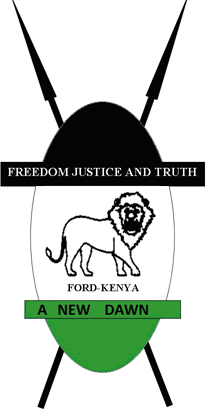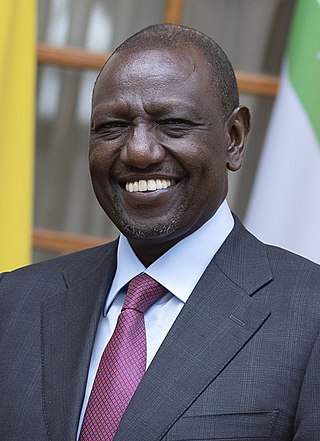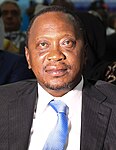
The politics of Kenya take place in a framework of a presidential representative democratic republic, whereby the president is both head of state and head of government, and of a multi-party system in accordance with a new constitution passed in 2010.

Uhuru Muigai Kenyatta is the fourth president of Kenya from 2013 to 2022. Kenyatta is the son of Jomo Kenyatta, Kenya's first president, and his fourth wife Mama Ngina Kenyatta. He has been married to Margaret Gakuo Kenyatta since 1991. They have three children: the two sons, Jomo and Muhoho, and a daughter, Ngina Kenyatta.

Stephen Kalonzo Musyoka is a Kenyan politician who was the tenth Vice-President of Kenya from 2008 to 2013. Musyoka served in the government under the late President Daniel arap Moi as the Secretary of Kenya African National Union party (1980-1988), Assistant Minister for Works (1986-1988), Deputy Speaker of the National Assembly (1988-1992), Minister for Foreign Affairs from 1993 until 1998, Minister of Education (1998-2001); and subsequently, under the late President Mwai Kibaki, he was Minister of Foreign Affairs again from 2003 to 2004, then Minister of the Environment from 2004 to 2005. He was an unsuccessful candidate in the 2007 presidential election, after which he was appointed vice-president by Kibaki in January 2008.

Forum for the Restoration of Democracy–Kenya (FORD–Kenya) is a Kenyan political party. The party has sat in the government of Kenya once, under the National Rainbow Coalition, from 2003 to 2007, having ended forty years of one party rule. In April 2022, the party joined the Kenya Kwanza coalition for the August 2022 elections, and is headed by Moses Wetangula, the current speaker of the National Assembly of Kenya. The party tends to be more popular among the Luhya people.

William Kipchirchir Samoei Arap Ruto is a Kenyan politician who is the fifth and current president of Kenya since 13 September 2022. Prior to becoming president, he served as the first elected deputy president of Kenya from 2013 to 2022. Previously, holders of the position were referred to as Vice President and the officeholder was unelected and appointed by the President. He previously served in three cabinet portfolios as the Minister for Home Affairs, the Minister of Agriculture and as Minister for Higher Education.

Raila Amolo Odinga is a Kenyan politician who served as the Prime Minister of Kenya from 2008 to 2013. He was the Member of Parliament (MP) for Langata Constituency from 1992 to 2013 and has been the Leader of Opposition in Kenya since 2013. He is the leader of Azimio la Umoja–One Kenya Coalition Party.
The Orange Democratic Movement (ODM) is a centre-left political party in Kenya. It is the successor of a grassroots people's movement that was formed during the 2005 Kenyan constitutional referendum campaign. This movement separated in August 2007 into the Orange Democratic Movement Party of Kenya and the Wiper Democratic Movement – Kenya.

General elections were held in Kenya on 4 March 2013. Voters elected the President, members of the National Assembly and newly formed Senate. They were the first elections held under the new constitution, which was approved in a 2010 referendum, and were also the first run by the new Independent Electoral and Boundaries Commission (IEBC). They coincided with the 2013 Kenyan local elections.

The Independent Electoral and Boundaries Commission (IEBC) is an independent regulatory agency that was founded in the year 2011 through the making of the Constitution of Kenya. The Commission is responsible for conducting or supervising referendums and elections to any elective body or office established by the Constitution, and any other elections as prescribed by an Act of Parliament. It was created in a provision of the 2010 constitution and the Independent Electoral and Boundaries Commission Act. Its mandate includes "the continuous registration of voters and revision of the voter's roll, the delimitation of constituencies and wards, the regulation of political parties process, the settlement of electoral disputes, the registration of candidates for elections, voter education, the facilitation of the observation, monitoring and evaluation of elections, the regulation of money spent by a candidate or party in respect of any election, the development of a code of conduct for candidates and parties, [and] the monitoring of compliance with legislation on nomination of candidates by parties."

The Supreme Court of Kenya is the highest court in Kenya. It is established under Article 163 of the Kenyan Constitution. As the highest court in the nation, its decisions are binding and set precedent on all other courts in the country.
The inauguration of Uhuru Kenyatta as the 4th president of Kenya took place on 9 April 2013. Kenyatta won 50.07% of the vote in the 2013 presidential election, after the supreme court dismissed the Raila petition on 30 March 2013. According to Article 141 (2) (b) of the constitution, in case the Supreme Court upholds the victory of the president-elect, the swearing in will take place on "the first Tuesday following the seventh day following the date on which the court renders a decision declaring the election to be valid." The event was held at Kasarani Stadium.A reception bouquet took place at State House,Nairobi.
The Kenya Presidential Election Petition of 2013 was an election petition aiming to declare the Kenya presidential election 2013 invalid. The Petition was filed at the Supreme Court of Kenya on 16 March 2013.

General elections were held in Kenya on 8 August 2017 to elect the President, members of the National Assembly and Senate. They coincided with the 2017 Kenyan local elections which elected Governors and representatives in the devolved governments.
Roselyn Kwamboka Akombe is a Kenyan former commissioner of the Independent Electoral and Boundaries Commission (IEBC) of Kenya.

The 2018 Kenya handshake was a political truce made on 9 March 2018 between Kenyan President Uhuru Kenyatta and former Kenyan Prime Minister Raila Odinga. The two had been the leaders of opposing political factions amidst widespread political violence and civil unrest; they had previously faced one another in the contested 2017 Kenyan general election. Under the agreement, their political feud with an agreement that Kenyatta would support Odinga in the upcoming presidential elections. Consequently, the Azimio coalition was formed, Uhuru became its chairman, and Odinga became the presidential candidate with Martha Karua as his running mate. They lost to William Ruto, who was then Kenyatta's deputy. They challenged Ruto's victory in the Supreme Court, but Chief Justice Martha Koome said his claims did not meet the evidentiary threshold and dismissed the case. At a March 2023 protest in Nairobi they demanded an audit of the IEBC election servers.

General elections were held in Kenya on Tuesday, 9 August 2022. Voters elected the president, governors, senators, members of the National Assembly, and members of county assemblies.

The Building Bridges Initiative (BBI) was a proposed set of amendments to the Constitution of Kenya initially proposed in October 2019. In the wake of the 2017 general election annulment and subsequent re-run, incumbent President Uhuru Kenyatta mandated the formation of the Presidential Taskforce on Building Bridges to Unity Advisory on 31 May 2018. The Taskforce was assigned to provide constitutional and legislative solutions in 9 broad categories:
- Lack of National Ethos
- Ethnic Antagonism and Competition
- Responsibilities and Rights
- Shared Prosperity
- Divisive Elections
- Safety and Security
- Devolution
- Corruption
- Inclusivity
David Ndii & Others V. Attorney General & Others also known as the BBI Judgement was a landmark ruling made in the Kenya High Court on 13 May 2021, declaring an injunction on Kenya's Independent Electoral and Boundaries Commission (IEBC) from proceeding with President Uhuru Kenyatta's and retired Prime Minister Raila Odinga's Building Bridges Initiative. The five-judge bench was to determine seventeen questions raised on the petition against the BBI Process.

Wafula Wanyonyi Chebukati is a Kenyan lawyer and a former chairman of the Independent Electoral and Boundaries Commission (IEBC), which is responsible for overseeing elections in Kenya. Wafula Chebukati was appointed to the position on a six-year tenure in January 2017 by the retired President of Kenya Uhuru Kenyatta. Following his appointment in 2017, He succeeded Ahmed Issack Hassan. He retired on 17th January 2023 following the end of his term.

Raila Odinga & another v Independent Electoral and Boundaries Commission & others [2017] KESC 31 (KLR) was a landmark decision by the Supreme Court of Kenya that nullified the presidential results of the 2017 General Elections in Kenya. The petition was brought forward by Raila Odinga and Kalonzo Musyoka, the National Super Alliance (NASA) candidates, challenging the legitimacy of Kenya's August 8, 2017, presidential election. They claimed that the Independent Electoral and Boundaries Commission (IEBC) and its chairperson, Wafula Chebukati, as well as Uhuru Kenyatta, the incumbent president and Jubilee Party candidate, committed irregularities during the election. They sought to overturn the election results and demanded a new election be conducted.














